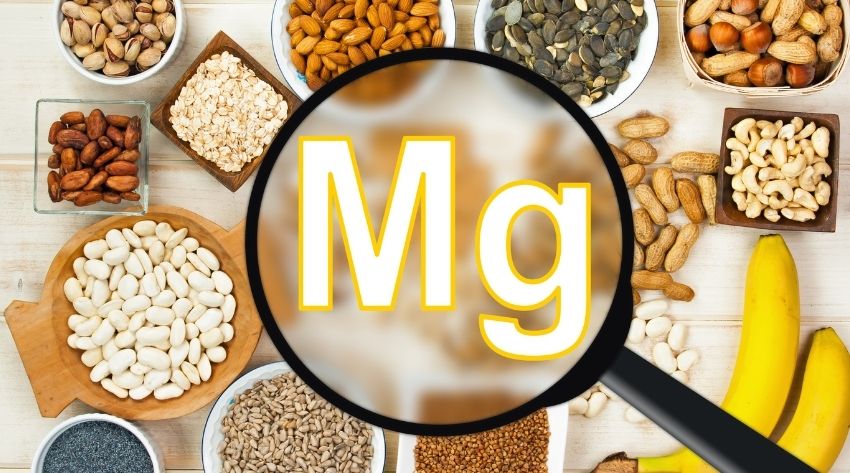Magnesium doesn’t get enough attention considering how essential it is for your health. Not only does magnesium help you maintain optimal blood pressure, but magnesium is also responsible for over 300 cellular actions, to optimize your health.
What are the Symptoms of Low Magnesium in the Body?
If you are suffering from low magnesium, you may notice any of the following:
- Muscle cramps
- Muscle twitches
- Mental disorders/psychological issues
- Osteoporosis (over the long term if the deficiency is not cleared up)
- High blood pressure
- A feeling of weakness
- Higher incidence rates of asthma
- Irregular heartbeats
- Nausea or vomiting
- Coronary spasms
- Numbness or Tingling
What Does Magnesium Do?
Synthesis of DNA
Magnesium helps your body manufacture DNA, which is the blueprint from which your cells are made from.
Promotes Heart Health
Magnesium has been shown to be very important for heart health and blood vessel health. Deficiency seems to worsen the inflammation, blood vessel constriction, stress responses, and blood clotting that lead to heart conditions. Taking sufficient magnesium appears to help heart health and reduces the risk of death.
Improves Stress Response and the Ability to Relax
Magnesium may significantly reduce stress in people who are deficient in magnesium. And, when it is combined with vitamin B6, it may help even more.
Improves Mood and Mental Health
A magnesium supplement significantly improved mood after 2 weeks in a trial, and another trial showed that magnesium supplements improved(6) mood in seniors with type 2 diabetes.
Creation of Insulin
Magnesium helps with the metabolism of insulin, and insulin is the hormone that helps maintain the proper balance of your blood glucose levels (1). So, as a result of low magnesium, there could be wide fluctuations in blood sugar levels and this is important for everyone, not just diabetics.
A large-scale systematic and dose-response study found that magnesium supplementation correlated with reduced body weight (9) and waist circumference among people. Those with resistance, hypertension, obesity, magnesium deficiency and women seem to weigh less with a smaller waist circumference if they are supplemented with magnesium.
Prevention of Alzheimer’s
A connection between insulin and Alzheimer’s has been found; in fact, Alzheimer’s is now being referred to as “Type III Diabetes.” This is another reason why Magnesium combined with a low carb, high protein diet is essential for brain health.
Maintenance of Blood Pressure
Most people are focused on sodium and potassium levels for blood pressure control. However, magnesium also plays a key role in maintaining healthy blood pressure. (3). It is important to take enough electrolytes and minerals on a daily basis for your blood pressure health.
Alleviate Migraines
Supplementing with magnesium could provide fast relief for headaches and migraines.(4)
Sleep
Magnesium can be a key component that leads to proper sleep (5). If sleep is insufficient, it causes a cascade of health issues physically and mentally. It may reduce insomnia, sleep latency, and cortisol. It may also increase melatonin, induce deeper sleep, and reduce the chance of waking up in the middle of the night.
Supports Fitness Performance and Recovery
Magnesium may help improve speed and strength, by making glucose metabolism more efficient (7), in addition to supporting the necessary stress response to exercise, reducing muscle damage, and improving exercise recovery.
Muscle Cramps
Restless leg syndrome is a condition that causes an irresistible urge to move the legs, and the feeling is common when a person hasn’t moved in a while, has been sitting for a long time, and during nighttime hours. In addition to movement helping this condition, most people find relief by supplementing with magnesium.
Improves Bone Density
Magnesium is an essential building block for your bones; deficiency can contribute to osteoporosis by preventing healthy bone formation, causing low-grade inflammation, increasing cortisol, and reducing parathyroid hormone.(8)
Supports Vitamin D Activation and Metabolism
Vitamin D and magnesium have important roles in bone health, immune function, and metabolism. Magnesium acts as a cofactor in vitamin D conversion and activation. Thus, magnesium deficiency can make vitamin D supplementation ineffective.
Foods High in Magnesium

- Animal Proteins. Some of the highest levels of magnesium are found in anchovy, crab meat, tuna, trout, turkey, salmon, halibut, mackerel, pork, and beef.
- Fatty Fish. Fish like salmon, mackerel, and halibut not only supply the needed high-quality protein but also have sufficient amounts of magnesium. A half of a filet provides 53 mg of magnesium.
- Bananas. In addition to being rich in potassium, they are also full of magnesium. One large banana has 37 mg.
- Dark Chocolate. Although dark chocolate has 64 mg in a 1-ounce serving, it is also a food with oxalates. I recommend using this sparingly as your source of magnesium.
- Avocados. One medium avocado has 58 mg of magnesium.
- Seeds. Many seeds including flax, pumpkin, and chia seeds contain high amounts of magnesium. One serving of pumpkin seed has 168 mg of magnesium.
- Spinach, Swiss Chard, and Almonds. These foods are very high in magnesium, but they are also high in oxalates. So, although I promote finding your nutrients in food sources, the damage from the oxalates to the body outweighs the benefits of getting the magnesium.
When is the Best Time to Take Magnesium During the Day?
The best time to have magnesium in your diet will be later on in the evening as if you take it then, it may help you lull yourself into a deeper sleep.
How Much Magnesium Do I Need to Eat Each Day?
For optimal health, you should aim to take in 310-420 mg of magnesium per day for the average adult. Keep in mind that if you are suffering from a health problem, your doctor may prescribe you to take more, up to a limit of 2500 mg per day. Only do this on the advice of a physician, however.
Why Magnesium Breakthrough
Magnesium is one of the most important minerals for all aspects of health. It participates in over 600 different biochemical reactions[1] in your body.
Yet, over 80% of the population don’t get the minimum amounts of the types of magnesium they need from diet alone because US soil lacks it. Magnesium deficiency can increase all disease risks and keep you from performing optimally.
Even people who supplement tend to take types that are poorly absorbed, or they only take two types of magnesium at most. Each type benefits different tissues and organ systems, and if you are only taking one or two forms, you’re most likely still deficient.
BiOptimizers Magnesium Breakthrough is the only supplement on the market that offers the full spectrum of all seven types of magnesium specially formulated to reach every tissue in your body to provide maximum health benefits and reverse low levels which could be causing health issues.
The 7 Types of magnesium included are:
- Magnesium Chelate. This form of magnesium is especially important for muscle building, recovery, and health.
- Magnesium Citrate. This helps with the effects of obesity. In fact, one study found that this form helped arterial stiffness in healthy overweight individuals.
- Magnesium Bisglycinate. This is often used to treat symptoms of excess stomach acid, such as stomach upset, heartburn, and acid indigestion.
- Magnesium Malate. Some believe this to be the most bioavailable form of magnesium. It’s found naturally in fruits, giving them a “tart taste.” Magnesium Malate can help with migraines, chronic pain, and depression.
- Magnesium Sucrosomial. This form of magnesium helps you to effectively produce energy. It also supports the immune system and is critical for bone health and skeletal development.
- Magnesium Taurate. This is the form of magnesium best for your heart.
- Magnesium Orotate. While also helpful for the heart, magnesium orotate is believed to be the best form for metabolic improvements. This makes it a favorite for athletes seeking enhanced recovery, energy, and performance.
DIRECTIONS: Take 1-2 capsules in the morning and at night. When you take magnesium in the morning, it supports brain function and stress response throughout the day. In the evening, high doses of magnesium promote relaxation and may help with sleep. It is better to take mineral supplements, such as magnesium, on an empty stomach because you will absorb it more efficiently.
REFERENCES
1. Barbagallo, Mario, et al. “Role of magnesium in insulin action, diabetes and cardio-metabolic syndrome X.” Molecular aspects of medicine 24.1-3 (2003): 39-52
2. Durlach, J. “Magnesium depletion and pathogenesis of Alzheimer’s disease.” Magnesium research 3.3 (1990): 217-218.
3. Dyckner, Thomas, and P. O. Wester. “Effect of magnesium on blood pressure.” Br Med J (Clin Res Ed) 286.6381 (1983): 1847-1849.
4. Swanson, Don R. “Migraine and magnesium: eleven neglected connections.” Perspectives in biology and medicine 31.4 (1988): 526-557.
5. Hornyak, Magdolna, et al. “Magnesium therapy for periodic leg movements-related insomnia and restless legs syndrome: an open pilot study.” Sleep 21.5 (1998): 501-505.
6. Barragán-Rodríguez L, Rodríguez-Morán M, Guerrero-Romero F. Efficacy and safety of oral magnesium supplementation in the treatment of depression in the elderly with type 2 diabetes: a randomized, equivalent trial. Magnes Res. 2008;21(4):218-223.
7. Zhang Y, Xun P, Wang R, Mao L, He K. Can Magnesium Enhance Exercise Performance?. Nutrients. 2017;9(9):946. Published 2017 Aug 28. doi:10.3390/nu9090946
8.Castiglioni S, Cazzaniga A, Albisetti W, Maier JA. Magnesium and osteoporosis: current state of knowledge and future research directions. Nutrients. 2013;5(8):3022-3033. Published 2013 Jul 31. doi:10.3390/nu5083022
9. Askari M, Mozaffari H, Jafari A, Ghanbari M, Darooghegi Mofrad M. The effects of magnesium supplementation on obesity measures in adults: a systematic review and dose-response meta-analysis of randomized controlled trials [published online ahead of print, 2020 Jul 11]. Crit Rev Food Sci Nutr. 2020;1-17. doi:10.1080/10408398.2020.1790498
Sara Banta
Sara Banta is a Stanford University Graduate with a Degree in Economics and Psychology, and a certified Natural Supplement Expert & Graduate of the Institute for Integrative Nutrition. Sara is the Founder of Accelerated Health Products and host of the health & wellness podcast, Accelerated Health Radio.









